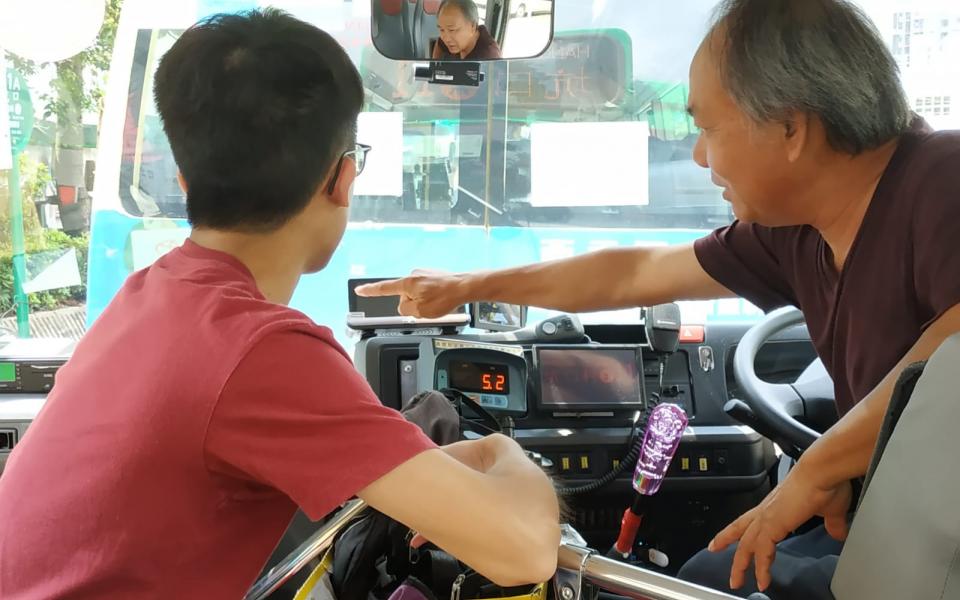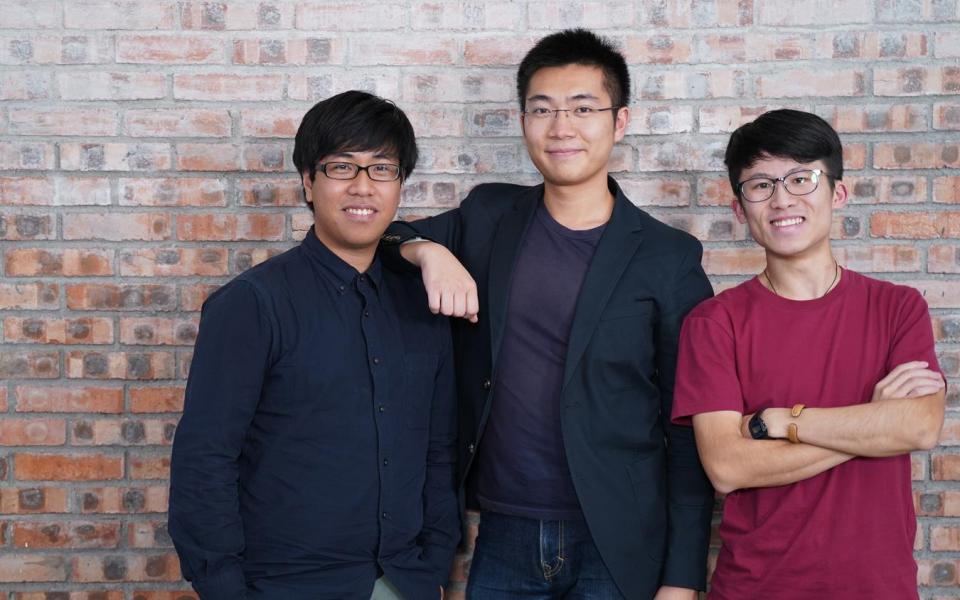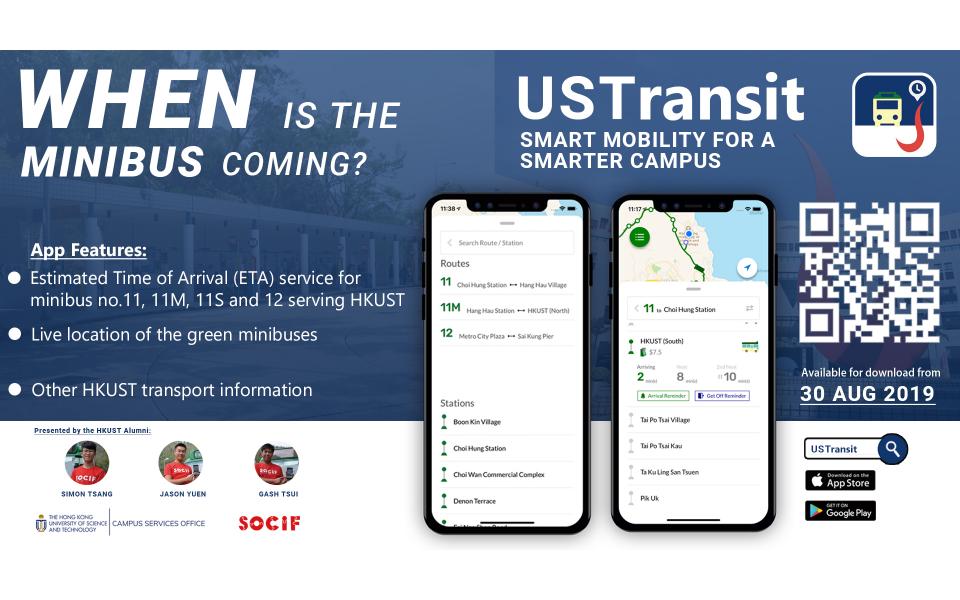TTC Test 200305-1.2 En Route to a Smarter City
This is a test on 20200305. Update 2
When we encounter problems with the facilities and systems we use in our daily lives, many of us experience frustration. Some, however, see an opportunity for change. Three alumni were not only inspired to establish a start-up to improve the commute to campus, but also to use their technical skills and talent to serve the university and the wider society with passion and empathy.
Staff, students and visitors to the HKUST campus often take minibuses to the University from the closest MTR stations. From the start of the fall semester in September 2019, an app called USTransit allowed people to trace the arrival time and related traffic information of several minibus lines to and from campus. The app has been very well received, recording over 7,000 downloads in the first two weeks of its launch and over 14,000 up to the present.
The app is the brainchild of alumni Gash TSUI Cheuk-Leong (BEng in Computer Science, 2019), Simon TSANG Pak-Kin (BEng in Computer Engineering, 2018) and Jason YUEN Lok-Haang (BBA in Marketing and Operations Management, 2018), who also established a startup called SOCIF in November 2018.
The young alumni still vividly remember the excitement of witnessing the official launch of the app and watching the first 15-second advertisement on the campus e-board at the Atrium on the first school day of the new academic year. “We stood there for 20 minutes waiting for the advertisement; it was a historic moment for us,” Gash says with a laugh.
First Steps
“When I was in Year 2, a bus company launched its app and I wondered why there was no such estimated time of arrival (ETA) app for the minibus. We suffered a lot waiting a long time for minibuses, never knowing where they were and when they would arrive. So I put down a few ideas on PowerPoint slides and started searching for working partners,” Jason says. Initially, he targeted serving the HKUST community only. “I simply wanted to know when the minibuses would arrive, but did not have a very detailed plan at that time.”
Through a workshop at the university’s Entrepreneurship Center, Jason found Simon and Gash. “I once almost missed my final exam due to the unexpectedly long queue for the minibus,” Gash recalls. Simon adds, “Everyone at HKUST has a wealth of negative experiences about waiting for minibuses. I was more than happy to have the chance to fully use my engineering knowledge, so I didn’t hesitate to join the team.”
With one student each from the fields of business, computer science and engineering, the team had a good balance of both hardware and software skills, and commercial and technologically driven mindsets.
Testing Ground
Although their target service area was the minibus routes to HKUST, they first ran their tests in Central. “We were referred to AMS, a minibus services operator, which was willing to let us test our prototype on their 8X route,” Simon explains. They spent nearly nine months on the tests, mainly to collect data and record the time taken to get to every stop, before consolidating their data and submitting it to AMS. “They were satisfied with the results, but, due to their business considerations, the company didn’t use our tool,” Jason says.
“We didn’t regard this as a setback, but a valuable experience and inspiration. We appreciate the research opportunity offered by AMS,” Jason says. “We realized that, while the app was undoubtedly useful for passengers, and the cost of every device was only a few hundreds, the minibus operators might see no reason to spend the extra money if the installation didn’t help them improve their operational efficiency?” They realized they would have to add additional features to encourage operators to employ it. “For example, we developed a dashboard for the operators so they can check the roster of drivers and the status of payrolls, which helped the management in various areas,” Simon adds.
The experience gave them an insight into the complexities of the minibus trade. “As students, we used to often complain about the long waiting time for a minibus and the frequency of services. But after communicating with the operators and drivers, we felt quite guilty. We had not put ourselves in their shoes and tried to understand the difficulties they face, such as insufficient manpower and resources,” Gash says.
Their reflection on the experience became one of the drivers of their determination to broaden the scope of SOCIF’s mission. “We hope to assist passengers as well as minibus operators through our system,” Simon says. Jason adds: “We want to enhance the travel experience. Even if the number of minibuses and queuing time does not change, hopefully passengers’ complaints will reduce once they better understand the real travel conditions.”
Turning Points
A year after setting up their company, Jason, Simon and Gash are happy to have already gained a number of substantial clients, ranging from the university to the corporate sector. They have also been invited by Microsoft to be their official partner.
HKUST was SOCIF’s first client. “Our alma mater is actively promoting a sustainable smart campus, which provided an opportunity for our app. HKUST purchased our customized service package, then liaised with the minibus operator,” says Jason. This was truly a turning point for the start-up. The team deeply appreciates the opportunities and support offered by HKUST.
“Our university always encourages us to try out our ideas, even the immature ones. It provided us with the resources to realize our ideas,” Simon agrees. Before moving into the Hong Kong Science Park by joining an incubation program, they used a co-working space offered by HKUST’s Entrepreneurship Center. “The Center recommended we join many exhibitions and competitions for start-ups as well,” Gash says. In 2019, they received a silver Student Innovation Award in the Hong Kong ICT Awards and a Merit Award (Tertiary Student – Business and Industrial) in the Asia Pacific ICT Alliance Awards.
HKUST also assisted them with publicity. “After SOCIF was set up, even though we only had a prototype, we were interviewed by a few media outlets on the ETA App. This drew the attention of the University’s Public Affairs Office and they helped us further line up some prominent media coverage,” says Jason, expressing his gratitude to the University, noting that the exposure significantly contributed to their business development.
Looking back on their affiliation with their alma mater, all three say they truly loved their time there and are proud to be part of a very special family. They treasure the all-round education that not only groomed them as engineers and entrepreneurs, but most importantly as people who are willing to be considerate and empathetic to the needs of others and to serve the wider community. It was this
that inspired their undertaking. Jason says, “We really wanted to contribute to the betterment of university community.”
Smart Solutions
Looking forward, they plan to work out the branding of the company and to keep creating and adding new elements to the business. As Chief Executive Officer, Jason says, “In the short term, we will keep working with HKUST to provide more smart mobility solutions. We are now trying to improve the ETA system and plan to apply it to the university shuttle bus as well.” Seat detection, online booking in advance and seat reservation are among the ideas they are working on. “We are trying to develop a sophisticated and full product package, which could then be offered to other clients.”
Chief Technical Officer Simon says, “As a middle-term target, we hope to tap the overseas market. A crucial point is to standardize our solutions and develop a subscription model for clients. This will help us to expand more quickly.”
Their ultimate goal is to contribute further to society in various areas, after successfully building a solid base on city mobility. “For example, we would like to develop solutions for fintech,” Chief Information Officer Gash says with confidence.
The three young entrepreneurs emphasize that they enjoy running their start-up and exploring opportunities in the wider world. “We may work from 10 a.m. to 5 a.m. every day when there are tight deadlines, but it’s ok, we are still young,” Jason laughs. All three have no regrets about their choices and are gearing up for a bright future.
About The Hong Kong University of Science and Technology
The Hong Kong University of Science and Technology (HKUST) (www.ust.hk) is a world-class research university that focuses on science, technology and business as well as humanities and social science. HKUST offers an international campus, and a holistic and interdisciplinary pedagogy to nurture well-rounded graduates with global vision, a strong entrepreneurial spirit and innovative thinking. HKUST attained the highest proportion of internationally excellent research work in the Research Assessment Exercise 2014 of Hong Kong’s University Grants Committee, and is ranked as the world’s best young university in Times Higher Education’s Young University Rankings 2019. Its graduates were ranked 16th worldwide and top in Greater China in Global University Employability Survey 2018.




